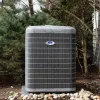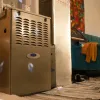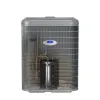It’s always nice when you can spend less than you thought you had to. And that’s especially true during times of high inflation.
Last August, President Biden signed the Inflation Reduction Act in an effort to soften the impact of rapidly rising prices. While the law is multifaceted and contains provisions relating to tax policy, healthcare, and deficit reduction, one area it targets is the energy market. Many consumers will feel the impact of this legislation in the form of tax credits or rebates when they upgrade to energy efficient appliances.
What does that mean for you? Well, the law is still new and some of its implications are still unknown. At the time of writing, we are still waiting for guidance about the federal money allocated to subsidize homeowners’ energy efficiency upgrades.
But there’s one thing we do know: If you install a more efficient HVAC system or electrify your home, the government might spot you some cash.
Inflation Reduction Act Tax Credits
As part of the Inflation Reduction Act, many consumers will qualify for tax credits when they perform home improvements that the government deems energy efficient. Specifically, the government will provide a credit of 30% of the costs of eligible energy upgrades up to a limit of $1,200 each year. The credits will be available for the 2023 tax year and won’t expire until 2032.
While some aspects of the Inflation Reduction Act remain unclear, this part does not: For the next several years, you can qualify for a tax credit every time you make an energy-related improvement to your home! Here’s a list of upgrades that qualify:
- Home energy audits
- Exterior door replacement
- Exterior window and skylight replacement
- Air conditioner replacement
- Furnace replacement
- Solar panel installation
- Heat pump HVAC system installation
- Heat pump water heater installation
In the case of heat pump HVAC systems and heat pump water heaters, you won’t be cut off at $1,200 in credits. You’ll actually receive up to $2,000 in tax credits for installing those products!
Inflation Reduction Act Rebate Program
In addition to getting tax credits for energy improvements, the new law includes a smorgasbord of rebates to defray the up-front costs of purchasing new equipment, appliances, or contractor services. Low-to-medium income households receive a greater benefit, but everyone can qualify.
Note: This is the part of the law where there’s still some uncertainty. The figures below are accurate to the best of our knowledge at the time of writing, but don’t hold us to it!
Rebate amounts are substantial for many of the improvements – low-income households can get back up to 100% of the total improvement costs! Qualifying purchases include things like:
- Heat pump water heaters (up to $1,750)
- Heat pump HVAC systems (up to $8,000)
- Electric ranges (up to $840)
- Electric clothes dryers (up to $840)
- Electric wiring installation for the new appliances (up to $2,500)
- Insulation, air sealing, and ventilation upgrades (up to $1,600)
Note that these rebates help cover not just the product cost, but also the cost of installation. This could be a great incentive for families that might not otherwise pursue energy upgrades due to installation costs.
Do these incentives make going all-electric worth it?
One interesting aspect of the new law is that new heat pumps qualify for up to $2,000 in tax credits – a number in excess of the $1,200 cap for other types of HVAC equipment.
Does that mean you should switch to an electric heat pump? That’s up to you to decide!
Many Atlanta-area homeowners are replacing their gas appliances with electric ones, and government incentives could push many more people in that direction. Even if you’re not ready to go all-electric, the rebates for insulation, air sealing, and ventilation upgrades should be appealing. A substantial number of homes we visit across Atlanta could use improvements in this regard!
In any event, the Inflation Reduction Act does have the potential to reduce the cost of upgrading your appliances and help more people enjoy the savings from energy efficient models, sooner. Whether you go all-electric or not, these tax credits and rebates offer major savings opportunities.
Why not take advantage of them?






